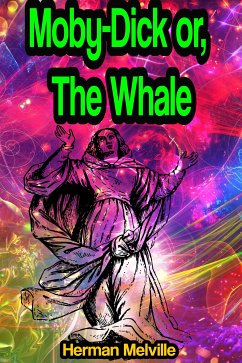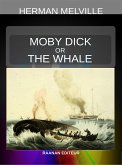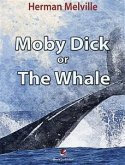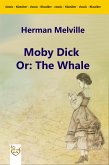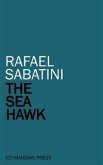Moby-Dick or, The Whale by Herman Melville is an 1851 novel by American writer Herman Melville. The book is the sailor Ishmael's narrative of the obsessive quest of Ahab, captain of the whaling ship Pequod, for revenge against Moby Dick, the giant white sperm whale that on the ship's previous voyage bit off Ahab's leg at the knee.
A contribution to the literature of the American Renaissance, Moby-Dick was published to mixed reviews, was a commercial failure, and was out of print at the time of the author's death in 1891. Its reputation as a "Great American Novel" was established only in the 20th century, after the 1919 centennial of its author's birth. William Faulkner said he wished he had written the book himself, and D. H. Lawrence called it "one of the strangest and most wonderful books in the world" and "the greatest book of the sea ever written". Its opening sentence, "Call me Ishmael", is among world literature's most famous.
Melville began writing Moby-Dick in February 1850 and finished 18 months later, a year after he had anticipated. Melville drew on his experience as a common sailor from 1841 to 1844, including several years on whalers, and on wide reading in whaling literature. The white whale is modeled on a notoriously hard-to-catch albino whale Mocha Dick, and the book's ending is based on the sinking of the whaleship Essex in 1820.
The detailed and realistic descriptions of whale hunting and of extracting whale oil, as well as life aboard ship among a culturally diverse crew, are mixed with exploration of class and social status, good and evil, and the existence of God. The book's literary influences include Shakespeare and the Bible. In addition to narrative prose, Melville uses styles and literary devices ranging from songs, poetry, and catalogs to Shakespearean stage directions, soliloquies, and asides.
In August 1850, with the manuscript perhaps half finished, he met Nathaniel Hawthorne and was deeply impressed by his Mosses from an Old Manse, which he compared to Shakespeare in its cosmic ambitions. This encounter may have inspired him to revise and deepen Moby-Dick, which is dedicated to Hawthorne, "in token of my admiration for his genius".
A contribution to the literature of the American Renaissance, Moby-Dick was published to mixed reviews, was a commercial failure, and was out of print at the time of the author's death in 1891. Its reputation as a "Great American Novel" was established only in the 20th century, after the 1919 centennial of its author's birth. William Faulkner said he wished he had written the book himself, and D. H. Lawrence called it "one of the strangest and most wonderful books in the world" and "the greatest book of the sea ever written". Its opening sentence, "Call me Ishmael", is among world literature's most famous.
Melville began writing Moby-Dick in February 1850 and finished 18 months later, a year after he had anticipated. Melville drew on his experience as a common sailor from 1841 to 1844, including several years on whalers, and on wide reading in whaling literature. The white whale is modeled on a notoriously hard-to-catch albino whale Mocha Dick, and the book's ending is based on the sinking of the whaleship Essex in 1820.
The detailed and realistic descriptions of whale hunting and of extracting whale oil, as well as life aboard ship among a culturally diverse crew, are mixed with exploration of class and social status, good and evil, and the existence of God. The book's literary influences include Shakespeare and the Bible. In addition to narrative prose, Melville uses styles and literary devices ranging from songs, poetry, and catalogs to Shakespearean stage directions, soliloquies, and asides.
In August 1850, with the manuscript perhaps half finished, he met Nathaniel Hawthorne and was deeply impressed by his Mosses from an Old Manse, which he compared to Shakespeare in its cosmic ambitions. This encounter may have inspired him to revise and deepen Moby-Dick, which is dedicated to Hawthorne, "in token of my admiration for his genius".

